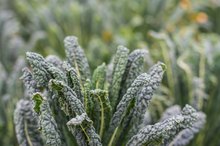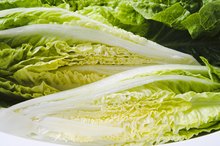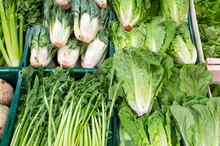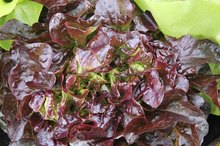What does fact checked mean?
At Healthfully, we strive to deliver objective content that is accurate and up-to-date. Our team periodically reviews articles in order to ensure content quality. The sources cited below consist of evidence from peer-reviewed journals, prominent medical organizations, academic associations, and government data.
The information contained on this site is for informational purposes only, and should not be used as a substitute for the advice of a professional health care provider. Please check with the appropriate physician regarding health questions and concerns. Although we strive to deliver accurate and up-to-date information, no guarantee to that effect is made.
Lettuce & Vitamin K
Lettuce is an important source of many important vitamins and nutrients, including vitamin K. Vitamin K's role in blood clotting and bone health make it an essential component to good health. And since the primary source of vitamin K is food, preparing meals with lettuce and other green, leafy vegetables is a good health practice.
Vitamin K Basics
Vitamin K is needed to make and activate proteins involved in the process of blood clotting and bone density. When you lack vitamin K, blood loss from injury increases and, accordingly, your chance for death rises. Too little vitamin K also puts you at greater risk for bone fractures 1. Good sources of vitamin K include spinach, turnip greens, collards, kale and lettuce.
- Vitamin K is needed to make and activate proteins involved in the process of blood clotting and bone density.
- Too little vitamin K also puts you at greater risk for bone fractures 1.
Lettuce and Vitamin K
Kale for a Blood Thinner
Learn More
Though lettuce may not provide as much vitamin K as other sources, such as spinach and turnip greens, it's still a good source. Different types of lettuce provide different amounts of vitamin K. One cup of iceberg lettuce provides 14 micrograms of vitamin K, a cup of green leaf lettuce offers 63 micrograms, while one cup of romaine lettuce contains 57 micrograms, giving support to darker heads of lettuce providing more nutrients. However, these lettuces' vitamin K content pales in comparison to that of other greens -- a cup of raw kale, for instance, contains 547 micrograms of vitamin K, while 1-cup servings or raw spinach or chard offer 145 or 299 micrograms, respectively.
Vitamin K and Blood Thinners
Lettuce and other foods rich in vitamin K need to be carefully consumed when on blood thinning medications. The mechanisms of these drugs are sensitive to vitamin K levels in the body. If you're on a blood thinner, you can't consume either too much or too little vitamin K on a daily basis. It's best to keep vitamin K intake stable from day to day if you're on such medications.
- Lettuce and other foods rich in vitamin K need to be carefully consumed when on blood thinning medications.
- If you're on a blood thinner, you can't consume either too much or too little vitamin K on a daily basis.
Recommendations
Is Lettuce Good for Losing Weight?
Learn More
The Institutes of Medicine recommends adult men consume 120 mcg of daily vitamin K and women consume 90 mcg. Not eating enough lettuce salad or other green, leafy vegetables puts you at risk for vitamin K deficiency, notes the Harvard School of Public Health. Make lettuce and other green, leafy vegetables a part of your daily menu. Using a bit more than two cups of romaine lettuce in a salad will exceed your daily requirement of vitamin K if you're an adult male.
- The Institutes of Medicine recommends adult men consume 120 mcg of daily vitamin K and women consume 90 mcg.
- Not eating enough lettuce salad or other green, leafy vegetables puts you at risk for vitamin K deficiency, notes the Harvard School of Public Health.
Related Articles
References
- University of Florida: Facts About Vitamin K
- USDA National Nutrient Database: Nutrient Lists
- Linus Pauling Institute: Vitamin K
- Rubin LP, Ross AC, Stephensen CB, Bohn T, Tanumihardjo SA. Metabolic effects of inflammation on vitamin A and carotenoids in humans and animal models. Adv Nutr. 2017;8(2):197-212. doi:10.3945/an.116.014167
- Sproston NR, Ashworth JJ. Role of C-reactive protein at sites of inflammation and infection. Front Immunol. 2018;9:754. doi:10.3389/fimmu.2018.00754
- Bird RP. The emerging role of vitamin B6 in inflammation and carcinogenesis. Adv Food Nutr Res. 2018;83:151-194. doi:10.1016/bs.afnr.2017.11.004
- Chambial S, Dwivedi S, Shukla KK, John PJ, Sharma P. Vitamin C in disease prevention and cure: an overview. Indian J Clin Biochem. 2013;28(4):314-28. doi: 10.1007/s12291-013-0375-3
- Forrest KY, Stuhldreher WL. Prevalence and correlates of vitamin D deficiency in US adults. Nutr Res. 2011;31(1):48-54. doi:10.1016/j.nutres.2010.12.001
- Zhang Y, Leung DY, Richers BN, et al. Vitamin D inhibits monocyte/macrophage proinflammatory cytokine production by targeting MAPK phosphatase-1. J Immunol. 2012;188(5):2127-35. doi:10.4049/jimmunol.1102412
- Saboori S, Shab-bidar S, Speakman JR, Yousefi rad E, Djafarian K. Effect of vitamin E supplementation on serum C-reactive protein level: a meta-analysis of randomized controlled trials. Eur J Clin Nutr. 2015;69(8):867-73. doi:10.1038/ejcn.2014.296
- National Institutes of Health. Vitamin K fact sheet for health professionals. Updated July 2019.
- Aslam MF, Majeed S, Aslam S, Irfan JA. Vitamins: key role players in boosting up immune response-a mini review. Vitam Miner. 2017; 6:153. doi:10.4172/2376-1318.1000153
- Harvard School of Public Health. Three of the B vitamins: folate, vitamin B6, and vitamin B12.
- National Institutes of Health. Folate fact sheet for health professionals. Updated July 2019.
- Palermo A, Tuccinardi D, D'Onofrio L, et al. Vitamin K and osteoporosis: myth or reality? Metabolism. 2017 May; 70:57-71. doi:10.1016/j.metabol.2017.01.032
- Valentini L, Pinto A, Bourdel-Marchasson I, et al. Impact of personalized diet and probiotic supplementation on inflammation, nutritional parameters and intestinal microbiota - The "RISTOMED project": Randomized controlled trial in healthy older people. Clin Nutr. 2015 Aug;34(4):593-602. doi:10.1016/j.clnu.2014.09.023
Writer Bio
Pia Grant has been a freelance writer since 2007, writing on topics of health, fitness, diet and lifestyle. Her clients include websites, businesses and newspapers, including "The Voice" and "The Alumni." She has a doctorate degree in the health sciences and attended Loyola University.









